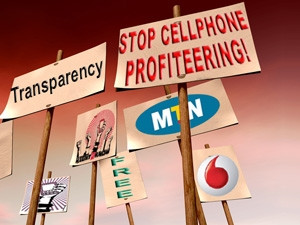
About 500 campaigners, who believe telecommunications is a basic human right, are expected to join a protest march by the Right2Know organisation in Cape Town tomorrow, in a plea for free airtime, SMS and data for South Africans.
The group will gather at the Cape Town International Convention Centre at 9am and march to Vodacom's central business district building, where it will await a response from SA's mobile duopoly - Vodacom and MTN - to a memo of demands, handed to the companies last month.
Formed in 2010 in a bid to halt the Secrecy Bill, Right2Know is calling on SA's leading mobile operators to make SMS perpetually free, bring down the overall cost of communication, simplify product offerings and employ transparency in all their dealings.
Ultimately, says Right2Know spokesperson Mark Weinberg, the right to communicate is enshrined by the country's constitution.
Cellular sins
In its memorandum, sent to Vodacom and MTN on World Press Freedom Day (3 May) Right2Know accuses the operators of profiteering, unethical and "possibly illegal" business practices and a lack of transparency.
The memo goes on to say Vodacom and MTN's business practices exploit the public, marginalise the poor and unemployed, and undermine economic growth and job creation. "SA is failing to realise the democratising potential of telecommunication in large part because Vodacom, MTN and the other cellphone operators have maintained high prices."
Right2Know points out operators are getting mammoth profits from SMS in particular. "The production cost of an SMS is estimated at R0.026, yet MTN and Vodacom charge up to R0.80 for an SMS. This amounts to 3 200% profit."
The organisation says similar calculations cannot be made regarding the cost of airtime and other services, "because operators keep necessary information secret".
Operators respond
Weinberg says he is aware the call for free telecoms is not something that will come to fruition overnight, and that the operators are not likely to "just hand it to us" - and tomorrow's protest is primarily to kick off a "transparent and public discussion" to make South Africans aware of the expenses involved in communication.
"We are not expecting a significant response [from Vodacom and MTN] at this point. The operators have made it clear that they are quite happy with the status quo."
Vodacom and MTN have acknowledged receipt of Right2Know's petition, and have both responded to the organisation's accusations and appeals.
Far-fetched
IDC analyst Spiwe Chireka says, while Right2Know's call for free telecoms for the South African masses is noble, it is by no means realistic or viable. At the end of the day, she notes, Vodacom and MTN are businesses.
"I must say that this is a first - the fact that they want free telecoms. They must realise that we are looking at a market where telecoms providers are profit-making entities with shareholders that want to see returns. Businesses need to make a profit - that is what they do."
Chireka says the other element at play is that of who will ultimately foot the bill for free telecoms. "Let's say for argument's sake that telecoms is a basic human right. That would mean government needs to ensure all South Africans have access, implying that the state incumbent [Telkom] would have to carry the cause [cost] of offering SA's people free telecoms.
"SA has over 100% cellphone penetration as it is, and the fact that someone will have to pay for the running of the network has to be considered. To be honest, operators are profit-makers and government has enough on its plate as it is. So [Right2Know's campaign] is a noble cause, but it is far-fetched."
Life before mobile
Analyst Dobek Pater says he does not regard telecoms as a basic human right as it is not fundamental to survival.
"Telecommunications is very important in the modern society as it can improve economic well-being and enhance social interaction among individuals, but it is not essential to the survival of a human being in a dignified manner - unlike food, housing, education and even freedom of speech."
Pater mirrors Chireka's argument that someone will ultimately have to pick up the tab: "Also, the notion of a basic human right indicates that a product/service must be provided to all individuals in some manner; ie, if you are not able to afford a basic right, it must be provided to you at no cost (someone else/the collective needs to pay for it)."
Furthermore, says Pater, while mobile devices significantly expedite the ability of individuals to access information and even participate in democratic processes, there are means of expressing views and accessing information other than via a mobile device.
Weinberg says, while Right2Know's campaign closely follows the launch of the Independent Communications Authority of SA's (ICASA's) cost to communicate programme, it has been in the pipeline for quite sometime. "ICASA's programme will be taken into consideration as well. It looks like there is some will to see movement on this front."
Share